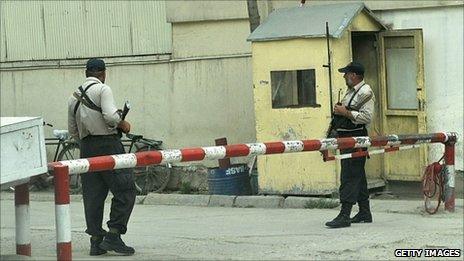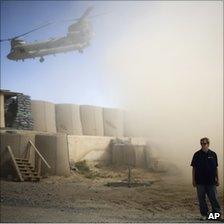UK private security fears in Afghanistan
- Published

Private security guards are widely used to guard compounds and convoys
As UK private security contractors are given four months to stand down in Afghanistan, security experts have warned the consequences could be dire.
President Hamid Karzai's decision to scrap the extensive private security industry operating in his country will come as no real surprise.
He vowed to curb its operations when he was sworn in as president last year, and has made no secret of the fact that he considers it a major source of instability.
But ask the British elements of the industry what effect the move may have, and warnings are quickly sounded.
They say commercial reconstruction projects would be at risk of delay - and workers of attack - as the exodus leaves them dangerously exposed.
Afghan police are simply not up to scratch when it comes to guarding foreign staff, they argue, and that could leave embassies and Nato supply convoys and bases vulnerable.
And already pressured troops will have their limited resources stretched further, as they are forced to do more security work to fill the gap, they say.
'Risk of attack'
Between 500 and 700 British contractors operate in Afghanistan, the British Association of Private Security Companies (BAPSC) estimates.
They are mainly paid to protect "assets" - either a person or a physical object such as a building.
But a good number are also former soldiers and hired by the US army to train Afghan soldiers and police officers.
BAPSC director general, Andrew Bearpark, said the Afghan government, police and army would be unable to operate properly without them.
"There aren't enough people trained up to high enough standards yet," he said.
"The real difficulties will be when the engineering projects are delayed because there are not enough people trained to protect them."
The Department for International Development supports a number of infrastructure programmes, including upgrading Gereshk hydro-power plant in Helmand, and building a road linking Lashkar Gah in Helmand to Gereshk.
It did not want to comment, but the Foreign Office has made some disgruntled noises following the announcement.
A source told the BBC the issue would be "urgently" raised with the Afghan authorities, and said it could have "serious implications" for how the international community operates there.
A spokesperson said: "The international community and businesses are currently dependent on legitimate private security contractors to operate in Afghanistan.
"We note President Karzai's decree on the dissolution of private security contractors and will discuss its implications with the Afghan authorities."
'Not up to the job'
Chris Kinsey, a security expert and academic at King's College London, said the biggest impact would be in the commercial sector.
"Corporations rely on private security firms for protection of their assets and staff," he said.
"The problem is, do they start relying on police and security forces who are quite frankly still not up to the job? It's quite possible that some of the projects may be put at risk of attack."
Mr Kinsey said the military's role in security could well become more extensive.

There are 52 registered private security firms operating in Afghanistan
"At the moment it is the other way around. These companies take on the security function that otherwise would have to be undertaken by Nato troops," he said.
"If you get rid of them, who will take on that responsibility? It may be the military, and that will extend their limited resources further."
Mr Bearpark said Nato may have to amend its procedures to ensure soldiers' lives are not put at extra risk.
Most contractors in Afghanistan are from the US, and make up the vast majority of the estimated 30,000 staff from 52 registered private security companies.
There are, however, many more unregistered firms, including 22 in the southern province of Kandahar alone.
Contractors working for international embassies and non-governmental organisations will be exempt from the decree, as long as security personnel stay within their compounds.
Mr Bearpark said: "There are already exceptions written into this decree, and it may be that by the time it is implemented there may be more exceptions or amendments."
ArmorGroup, one of the largest private British security firms, said it employed about 1,500 staff in Afghanistan working for governments, non-government organisations and commercial firms.
A spokeswoman said of Mr Karzai's announcement: "It is too early to comment on any specifics, but as you would expect we are discussing the potential implications with our customers."
- Published17 August 2010
- Published2 July 2010